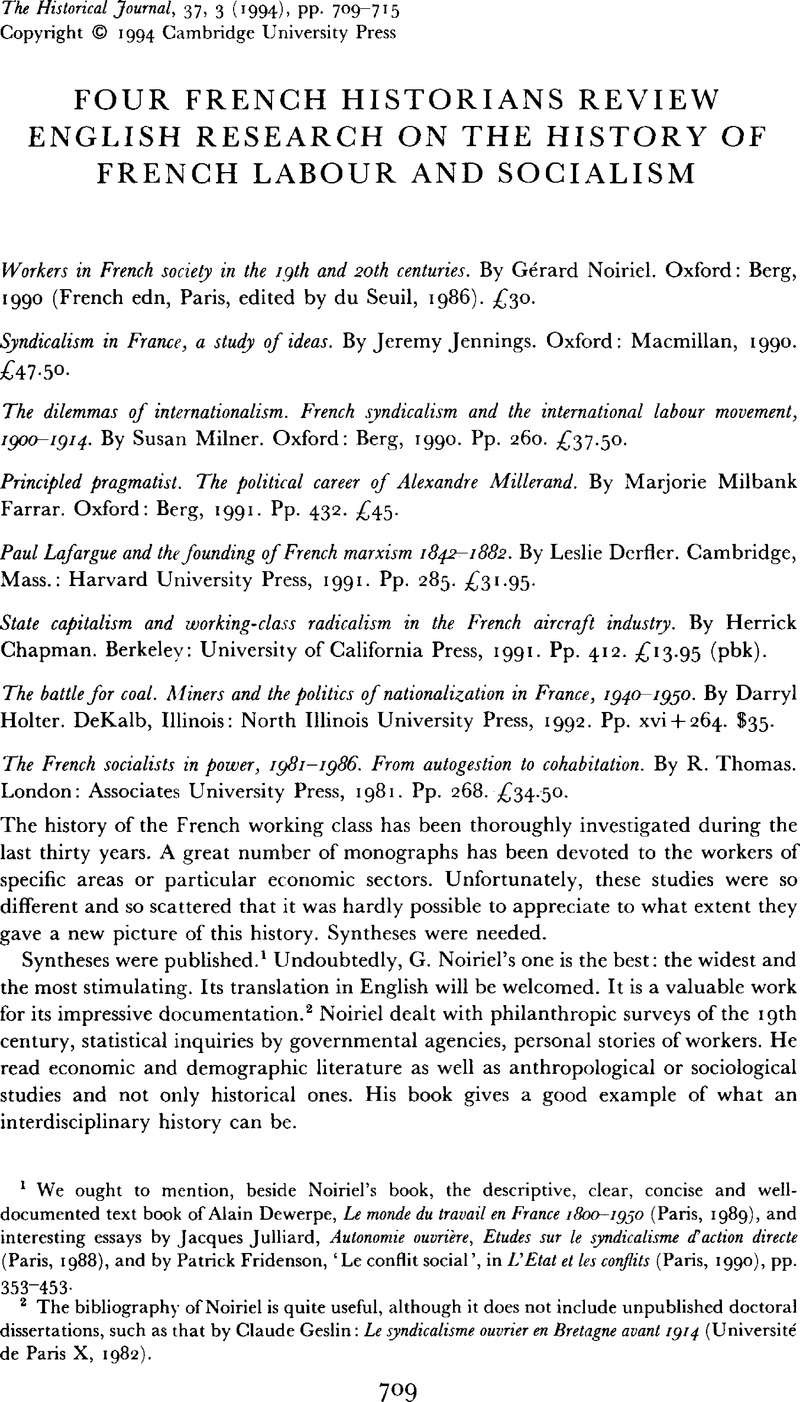No CrossRef data available.
Published online by Cambridge University Press: 11 February 2009

1 We ought to mention, beside Noiriel's book, the descriptive, clear, concise and well-documented text book of Dewerpe, Alain, Le monde du travail en France 1800–1950 (Paris, 1989)Google Scholar, and interesting essays by Julliard, Jacques, Aulonomie ouvrière, Etudes sur le syndicalistic d'action directe (Paris, 1988)Google Scholar, and by Fridenson, Patrick, ‘Le conflit social’, in L'Etat et Us conflits (Paris, 1990), pp. 353–453.Google Scholar
2 The bibliography of Noiriel is quite useful, although it does not include unpublished doctoral dissertations, such as that by Geslin, Claude: Le syndicalisme ouvrier en Bretagne avant 1914 (Université de Paris X, 1982).Google Scholar
3 His doctoral dissertation (published in a shorter version: Longwy, immigrés et prolétaires 1880–1980 (Paris, 1984)Google Scholar) dealt with the Longwy steel and iron industry before the First World War, an area where Italian immigrant workers were very numerous. His interest in the issue of immigration led him to write two books where he showed that immigration was not a kind of mechanical transfer of population, but a socially and legally managed phenomena: Le Creuset français. Hisloire de l'immigration XIX°–XX° (Paris, 1988)Google Scholar and La Tyrannic du national. Le droit d'asile en Europe 1793–1993 (Paris, 1991).Google Scholar
4 Trempé, Rolande, Les trois batailles du charbon (Paris, 1989).Google Scholar
5 Mitterrand, socialist minister in 1948, p. 171; the first Monnet plan in 1945, p. 188; Thorez going to the Soviet Union because of a cancer, p. 192. The review L'Esprit (in place of Esprit), p. 120 and 227n.; Auguste (in place of Augustin) Laurent, pp. 132 & 147; René Bélin (for Belin), p. 41; the Comités des entreprises (for Comités d'entreprise), p. 142; la Saint Barbé (for la Sainte Barbe), p. 147.
6 Surprisingly, Holter does not take into account evidence from Marie-Renée Valentin who published an article on this strike next to one of his own papers (see Le Mouvement social, no. 130, janvier-mars 1985, Holter, Darryl, ‘Politique charbonniere et guerre froide, 1945–1950’, pp. 33–54Google Scholar, Valentin, Marie-René, ‘Les greves des cheminots francais au cours de l'annee 1947’, pp. 55–81Google Scholar). The railway crash of Arras was provoked by a communist ‘commando’ headed by R. Pannequin without the approval of the central authorities of the party. This is a well-known story. Lecoeur and Pannequin themselves acknowledged their responsibility (see Mosco, , Mémoires d'ex. Le PCF de 1920 à 1989 (Paris, 1991), pp. 75 and 93).Google Scholar
7 P. 90, Lang was not young enough still to be a student in the Sorbonne in 1968. P. 77, the SFIO of D. Mayer and J. Moch had been much more involved in the nationalizations of 1945–6 than said on p. 77.